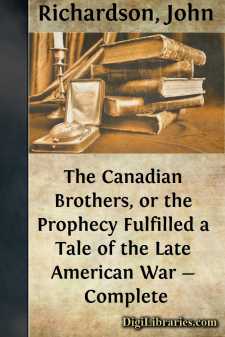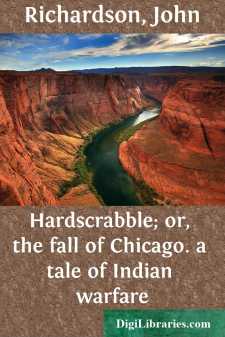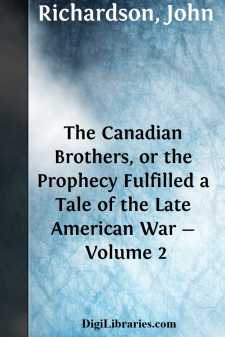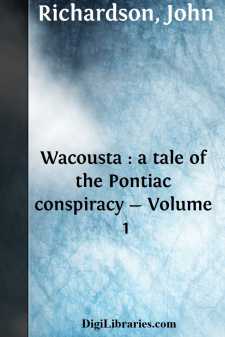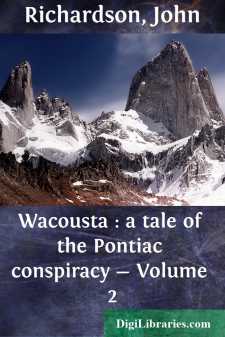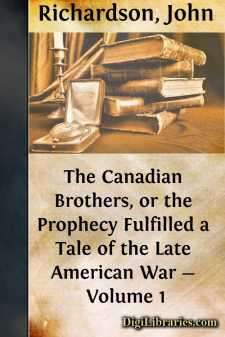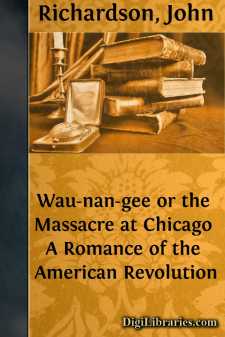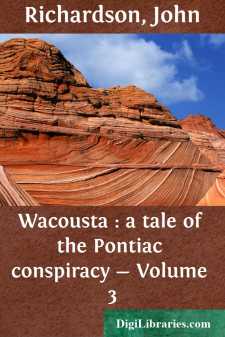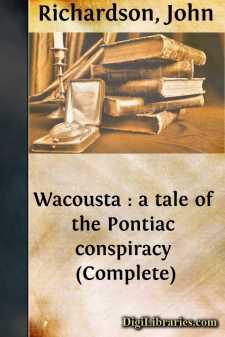Categories
- Antiques & Collectibles 13
- Architecture 36
- Art 48
- Bibles 22
- Biography & Autobiography 813
- Body, Mind & Spirit 142
- Business & Economics 28
- Children's Books 17
- Children's Fiction 14
- Computers 4
- Cooking 94
- Crafts & Hobbies 4
- Drama 346
- Education 46
- Family & Relationships 57
- Fiction 11829
- Games 19
- Gardening 17
- Health & Fitness 34
- History 1377
- House & Home 1
- Humor 147
- Juvenile Fiction 1873
- Juvenile Nonfiction 202
- Language Arts & Disciplines 88
- Law 16
- Literary Collections 686
- Literary Criticism 179
- Mathematics 13
- Medical 41
- Music 40
- Nature 179
- Non-Classifiable 1768
- Performing Arts 7
- Periodicals 1453
- Philosophy 64
- Photography 2
- Poetry 896
- Political Science 203
- Psychology 42
- Reference 154
- Religion 513
- Science 126
- Self-Help 84
- Social Science 81
- Sports & Recreation 34
- Study Aids 3
- Technology & Engineering 59
- Transportation 23
- Travel 463
- True Crime 29
The Canadian Brothers, or the Prophecy Fulfilled a Tale of the Late American War - Complete
by: John Richardson
Categories:
Description:
Excerpt
DEAR SIR,—I have received your letter of the 27th instant, and beg to reply that there cannot be the least objection to your sending a copy of your work, with the autograph addition; and that if you will send it to me, I will present it to His Majesty.
I do not presume you wish to apply for permission to dedicate the work to His Majesty, which is not usually given for work of fiction.
I remain, Dear Sir, your faithful Servant,
(Signed,) H. TAYLOR
Lieut. RICHARDSON, &c. &c. &c.
H. P. 92nd Regt.
BRIGHTON, December 18, 1832.
DEAR Sir,—I beg to acknowledge the receipt of your letter of the 14th instant, and of the copy of your work, WACOUSTA, for the King, which I have had the honor of presenting to His Majesty, who received it very graciously.
I remain, Dear Sir, your faithful Servant,
(Signed,) H. TAYLOR
Lieut. RICHARDSON, &c. &c. &c.
H. P. 92nd Regt.
WINDSOR CASTLE, August 7, 1833.
DEAR SIR,—I have to acknowledge your letter of the 1st instant, together with its enclosure, and beg to express the deep gratification I have felt in the perusal of that chapter of your new work which treats of the policy of employing the Indians in any future war we may have with the United States. Should you be desirous of dedicating it to His Majesty I can foresee no difficulty.
Permit me to avail myself of this opportunity of assuring you of the deep interest with which your WACOUSTA has been read by the whole Court.
I remain, Dear Sir, your faithful Servant,
(Signed,) H. TAYLOR.
Lieut. RICHARDSON, &c. &c. &c.
H. P. 92nd Regt.
WINDSOR CASTLE, August 12, 1833.
DEAR SIR,—I beg to acknowledge the receipt of your letter of the 9th, and to acquaint you that His Majesty acquiesces in your wish to be permitted to dedicate your new work to him.
I remain, Dear Sir, your faithful Servant,
(Signed,) H. TAYLOR.
Lieut. RICHARDSON, &c, &c. &c.
H. P. 92nd Regt.
By the above letters, two material points are established. The first is that, although works of fiction are not usually dedicated to the Sovereign, an exception was made in favour of the following tale, which is now for the first time submitted to the public, and which, from its historical character, was deemed of sufficient importance not to be confounded with mere works of fiction. The exception was grounded on a chapter of the book, which the seeker after incident alone will dismiss hastily, but over which the more serious reader may be induced to pause.
The second, and not least important, point disposed of, is one which the manner in which the principal American characters have been disposed of, renders in some degree imperative.
The Author has no hesitation in stating, that had it not been for the very strong interest taken in their appearance, by a portion of the American public in the first instance, these volumes never would have been submitted to the press of this country. Hence, to a corresponding feeling might, under other circumstances, have been ascribed the favorable light under which the American character has been portrayed. From the dates of the above letters from the principal Aid-de-Camp and Private Secretary to His late Majesty, it will, however, be seen, that the work was written in England, and therefore before there could have existed the slightest inducement to any undue partiality....


